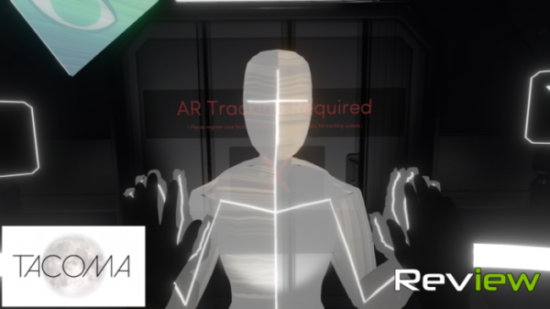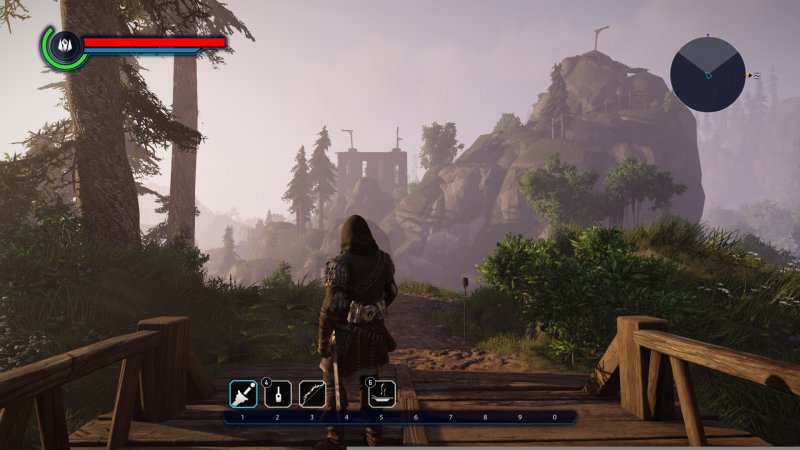THE SPACE STATION Tacoma is full of phantoms. Fragments of conversations, traces of casual strolls. The ephemera of life somehow given shape. See, the Tacoma’s inhabitants are recorded constantly, their biometric data and every moment of their daily lives catalogued and stored by the station’s on-board AI, ODIN. That data ostensibly belongs to Venturis, the megacorp that uses the station as a shipping outpost; when Venturis employees leave the Tacoma, it’s supposed to be deleted.
But it’s not. At least not all of it.
Gamers have been awaiting Tacoma, out August 2 on PC and Xbox One, for some time, in large part because of studio The Fullbright Company’s previous game. 2013’s Gone Home was not only groundbreaking, but utterly unexpected for its time: a fully realized 3D, first-person game with a strong narrative and no combat. It took aesthetic and design ideas from gaming’s mainstream and pared them down, cutting out violence and fantasy in favor of psychological realism. Gone Home was the story of a girl returning to her family’s empty house; as she (and you) and explore it, the story emerges of what their lives have been like in your absence.
Similarly, Tacoma places you on the vacant Tacoma after a mysterious accident, tasked with retrieving ODIN for Venturis. Those phantom scraps of data show up as static in your augmented-reality display, allowing you to play them back in the 3D space around you; rewind them, fast forward them, watching their choreography from any angle you desire. As you comb through the station, downloading every part of ODIN on behalf of Venturis, you play the digital voyeur. You watch, you learn, and bit by lost bit, you piece together the story of the Tacoma.

Space stations are classic videogame settings, and the aesthetic touches here are familiar. See the long, cavernous tunnels connecting the various modules of the station. Hear the automatic doors hiss open and shut. If you close your eyes, you can almost smell the recycled oxygen. Fullbright’s vision of the future is more focused on the humanistic than the technological, though. The six individuals who worked on the Tacoma before you arrived come from a variety of backgrounds, each occupying their own little pocket of the station. A botanist, an engineer, a doctor. They’re all contractors, struggling with the Venturi Corporation’s indifference, trying to gather resources to build their own futures despite their immense amount of training and talent. Imagine the Nostromo’s blue-collar grunts from the original Alien, reimagined for the gig economy. Theirs are the stories you uncover in Tacoma.
Via your ongoing digital voyeurism, you access their old computers, conjuring their ghosts to watch them move and talk—and that mechanic stands out as Tacoma’s strongest and most distinctive twist on Gone Home‘s exploration. Most games like this make you an archaeologist, digging up secrets; Tacoma makes you a cinematographer, framing and reframing past events with your own perspective. Frequently, the recordings will take place over sprawling, multi-room spaces. In order to piece the full scene together, you have to pause and rewind their performances multiple times, following different characters each time, collecting shots to edit in your mind.
Tacoma, then, feels like an almost creative experience. In creating a game about uncovering the mystery of its setting, Fullbright has also created a riff on experimental theater: a space to feel and see a story play out from the perspective you choose.
Experiments don’t always make for the most enthralling narratives in their own right, though, and Tacoma begins to wobble when it attempts to draw you in. It’s not the fault of the writing or plotting; the game’s tale of late capitalist excess, and the power of individuals to care for each other within systems of economic oppression, is compelling. The problem is with the perspective itself. The game’s best trick renders you an observer, and by doing so it weakens the player’s ability to deeply connect to the world it places you in. Tacoma’s gaze is expressive, but it’s also distant. You don’t really exist in the same world as these people, after all. They act on a stage for you. Memories, not friends. Ghosts and echoes.
In practice, this means that Tacoma’s successes, while real, never ring quite as loudly as they feel like they should. It builds cleverly on the ideas of its genre, and it bleeds craftsmanship in every moment of its visual and sonic design. It’s smart, and occasionally powerful. But it’s rarely resonant. Like the void its setting floats in, Fullbright’s latest feels too cold to sustain life.


